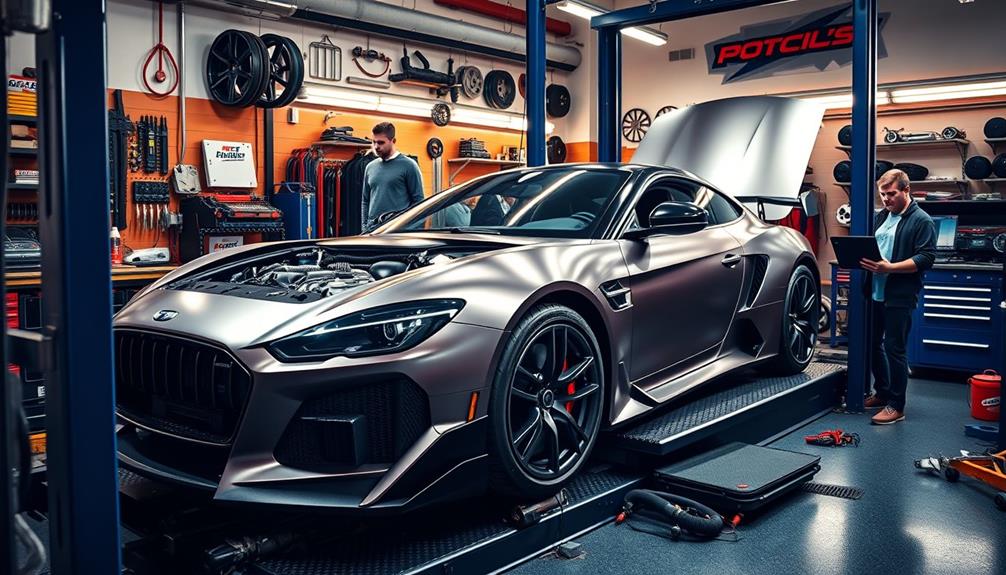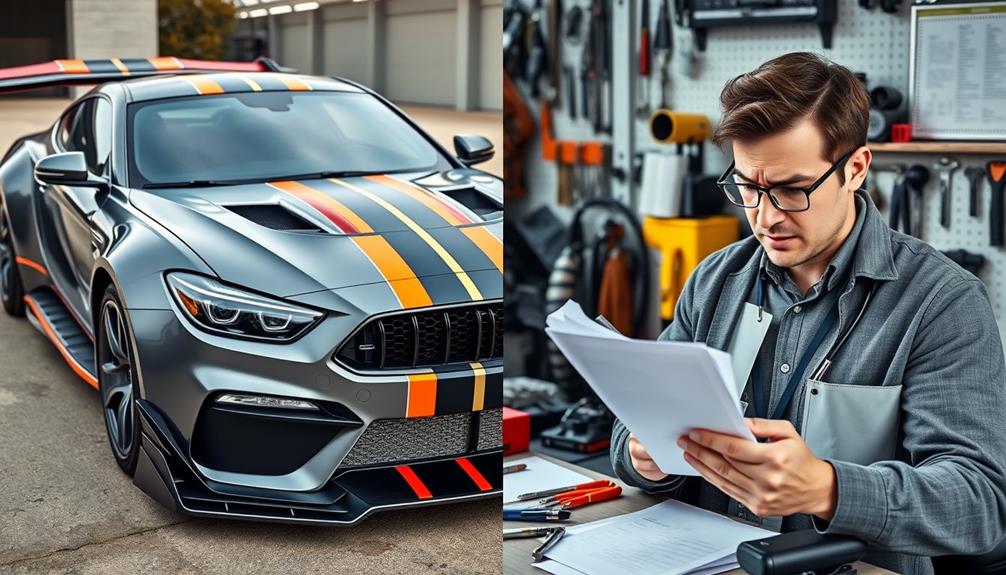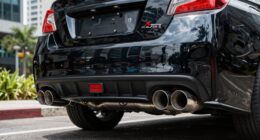Car tuning can definitely be profitable, especially with the rising interest in performance modifications and aesthetic upgrades. By blending service provision with product manufacturing, you can create a steady revenue stream while building a unique brand identity. It's essential to communicate clearly with customers about their needs and your pricing to avoid misunderstandings. Additionally, staying educated on industry advancements can help you adapt your offerings. As trends shift, opportunities in electric vehicle tuning are emerging, paving the way for future growth. If you're curious about how to maximize your success in this evolving market, there's more to explore. Car tuning safety considerations are also crucial to consider when building a successful car tuning business. Ensuring that all modifications and upgrades meet safety standards and do not compromise the overall performance and reliability of the vehicle is essential for customer satisfaction and the reputation of your brand. Staying updated on safety regulations and best practices in car tuning will not only enhance the quality of your services but also contribute to the long-term success and sustainability of your business.
Key Takeaways
- Car tuning combines service provision and product manufacturing, creating diverse revenue streams and fostering brand identity.
- Clear communication of offerings and pricing helps build customer trust and prevents misunderstandings, ensuring repeat business.
- Continuous education and specialized knowledge in tuning trends enhance service quality and adaptability to market demands.
- The rise of electric vehicles presents new opportunities for profitable tuning solutions, catering to a growing market segment.
- Operational efficiency through templated builds streamlines processes, reducing costs and increasing profitability in the tuning business.
Understanding Customer Needs
Understanding customer needs in car tuning involves recognizing their desire for high-performance modifications and aesthetic upgrades. You'll find that customers often seek enhancements not just for speed but also for visual appeal, influenced by personal passion and social media trends.
It's crucial to tap into these motivations when discussing performance modifications. Accurate pricing plays a critical role in this process. Customers frequently face inflated final bills that diverge from initial estimates. By focusing on clear communication of expectations, you can prevent misunderstandings and foster trust.
Shifting to GM tuning, for instance, can help you create realistic performance packages, leading to more accurate quotes and ultimately a more satisfied clientele. Market research reveals a growing interest in performance and aesthetic modifications, highlighting the importance of understanding evolving customer desires.
Business Models in Tuning

A successful car tuning business often employs a blended model that combines both service provision and product manufacturing. This approach not only sustains growth but also fosters innovation.
Here are four key elements of this business model:
- Service Provision: Offering custom tuning and installations guarantees a steady revenue stream, allowing for continuous product development.
- Product Manufacturing: Building performance parts and accessories enables you to create a unique brand identity while serving customer needs.
- Market Diversification: Tuning shops that expand into popular domestic models like GM and Ford can tap into regional demand, increasing their customer base.
- Operational Efficiency: Shifting from custom fabrication to templated builds streamlines your processes, enabling you to focus on branded products or partnerships for long-term sustainability.
Additionally, customer education plays a crucial role in managing expectations around performance modifications.
By informing clients about the complexities and costs involved, you can reduce frustrations related to budget constraints, guaranteeing a smoother experience and fostering loyalty.
Balancing service provision and product manufacturing is essential for thriving in the competitive tuning market.
Education and Training Opportunities
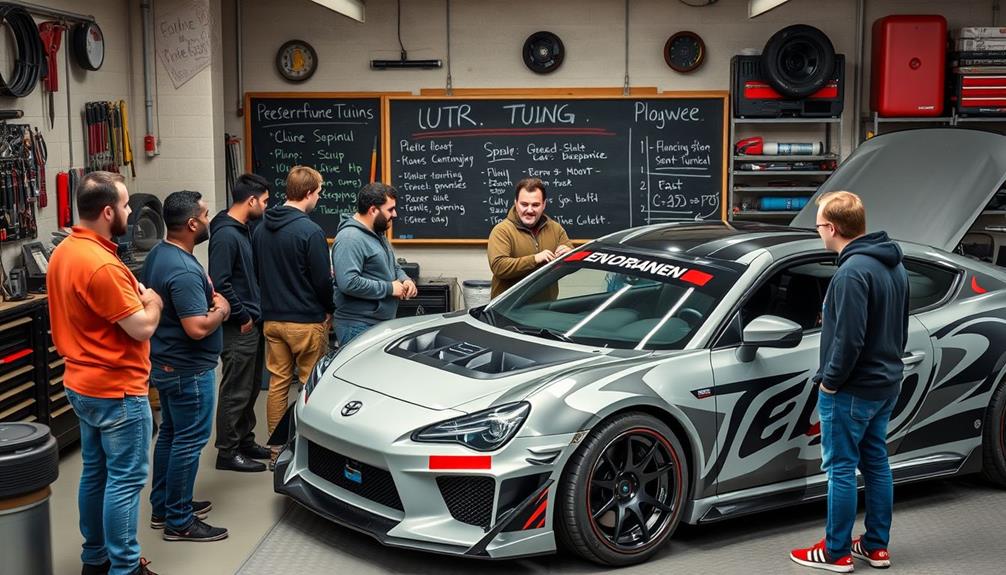
Car tuning enthusiasts can greatly benefit from specialized education and training opportunities that enhance their skills and knowledge. One excellent resource is the High Performance Academy (HPA), which offers a range of online courses focused on tuning, engine building, and wiring harness construction.
Whether you're interested in standalone engine management systems or factory reflashing techniques, HPA's curriculum is designed to deepen your technical expertise about performance modifications and tuning strategies.
These online courses aren't only informative but also accessible, featuring a 60-day money-back guarantee and discounts for podcast listeners. Many automotive enthusiasts find that this cost-effective education allows them to make informed decisions about their tuning projects.
With the rapid advancements in the industry, such as the shift from port injection to direct injection technologies, continuous education in tuning is crucial. Staying current on market trends guarantees you're well-prepared to tackle the latest challenges in high-performance automotive modifications.
Investing in your education and training will empower you to excel in the dynamic world of car tuning, enhancing both your skills and your potential for profitability in this exciting business.
Market Challenges and Strategies

Maneuvering the automotive tuning market can be challenging due to its competitive landscape and evolving customer demands.
You'll need to navigate various market challenges while ensuring you meet customer expectations. Here are some strategies to contemplate:
- Define Clear Offerings: Clearly outline your performance modifications and services to avoid misunderstandings about costs and outcomes.
- Adapt to Budget Constraints: Acknowledge customer budget limitations and find ways to deliver quality without sacrificing your standards.
- Invest in Specialized Knowledge: Stay updated on industry advancements like the shift from port to direct injection, fostering expertise that sets you apart.
- Focus on Service-Based Revenue: Develop robust service offerings to create consistent income streams, which can support the growth of in-house products.
Future Trends in Car Tuning
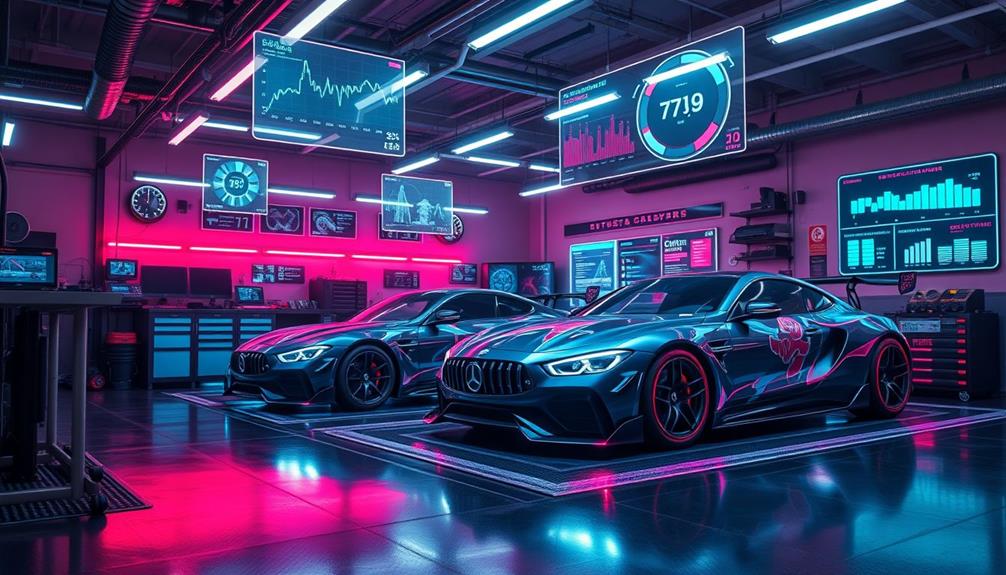
The future of car tuning is poised for transformation as electric vehicles (EVs) gain popularity, reshaping the landscape of performance modifications. As an enthusiast, you'll notice a growing demand for tuning solutions tailored specifically for EVs, aimed at enhancing power and efficiency.
Advances in software tuning and remote calibration are now making modifications simpler and more accessible, allowing you to tweak your vehicle without extensive physical changes. This shift mirrors trends seen in AI-Powered Virtual Reality in E-Learning, where technology enhances user engagement and personalization.
The rise of aftermarket parts designed for popular EV models is opening up new revenue opportunities for tuning shops. You'll see an increase in options, from performance-enhancing kits to suspension upgrades, catering to your desire for personalization.
Additionally, the trend towards eco-friendly modifications is gaining traction, focusing on optimizing efficiency and reducing emissions while preserving power gains.
Online communities and social media platforms are essential in this evolving landscape. They serve as hubs for sharing knowledge, experiences, and innovative tuning products. Engaging with these communities can help you stay updated on the latest trends and technologies, ensuring your tuning journey aligns with both performance and sustainability.
Embrace these changes, and you'll find exciting opportunities in the world of car tuning.
Frequently Asked Questions
How Much Do Performance Car Tuners Make?
Performance car tuners typically make between $50,000 and $100,000 annually, influenced by their experience, location, and business scale. Specialized services can command hourly rates of $75 to $150, enhancing overall earnings considerably.
Do Car Tuners Make Money?
You can definitely make money as a car tuner. By offering quality services, establishing clear pricing, and tapping into the growing demand for performance mods, you'll attract customers and build a profitable business.
Are Car Tuners in Demand?
Car tuners are in high demand, like a roaring engine in a quiet street. With enthusiasts seeking performance upgrades and online learning booming, you'll find opportunities everywhere, turning passion into a thriving community.
Does Tuning a Car Increase Its Value?
Yes, tuning a car can increase its value, especially for high-performance models. Enthusiasts often pay a premium for well-documented modifications, but remember, poorly executed tuning might actually decrease your vehicle's appeal to potential buyers.
Conclusion
In the world of car tuning, understanding your customers' needs is key to revving up profits. With various business models and the right training, you can steer your venture toward success. While challenges may arise, adapting to market trends can keep you ahead of the curve. So, if you play your cards right and stay passionate, you'll find that tuning cars can indeed be a rewarding ride. Embrace the journey, and enjoy the drive!
